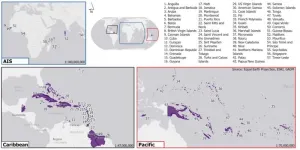(Press-News.org) A new study has exposed for the first time how inhabitants of the smallest countries globally, contributing least to climate change, already bear the brunt of its devastating consequences and the burden is likely to worsen.
The research, led by the University of Bristol, showed on average nearly one in five people (20%) in Small Island Developing States (SIDS) – totalling some 8.5million – are now exposed to coastal and inland flooding. For three of the 57 countries concentrated in the Pacific, Caribbean, Indian Ocean, and South China Sea, namely the Bahamas, Guyana, and Tuvalu, this proportion trebles to more than 60% of the population, according to the findings.
Amidst record-breaking rainfall and catastrophic scenes in Valencia, Spain, the findings further highlight the severe risk of flooding for people in all parts of the world.
Lead author Leanne Archer, Research Associate at the University’s Cabot Institute for the Environment, said: “Flooding is now an alarming real-world threat for so many people globally. This study demonstrates that the often-overlooked Small Island Developing States are already subject to a disproportionate level of flood exposure, despite contributing the least to climate change.”
Projections also showed that in future, even in the least-worst global warming scenario considered, the number of people affected by rising sea levels, storm surge and extreme rainfall events, including tropical cyclones, will significantly grow. For comparison, the scale of people likely to be affected dwarfs the level of flood exposure in developed nations such as the US and UK, where around 13% and 8% of the population are impacted respectively.
Leanne said: “The findings should be a call to action to support these nations in adapting to and mitigating against these extreme repercussions, even under the lowest emissions scenario, which put life and livelihoods in peril.”
SIDS are group of island nations and territories, with smaller populations ranging from around 1000 to 7,000,000 people, identified by the United Nations (UN) as being especially exposed to the effects of climate change. Coastal flooding is a major driver of flood risk as the populations are often most concentrated along coastlines. But findings showed inland flooding is in fact a huge issue for SIDS, accounting for the vast majority of overall population exposure at 81%.
Leanne, who conducted the research for her PhD in flood risk, said: “Previous studies have only focused on coastal flooding, representing a significant underestimation of exposure. This is also the very first time a comprehensive picture of flood risk has been mapped across all 57 Small Island Developing States because the populations are so small, they haven’t met the minimum catchment size of previous major global studies.
“The modelling provides striking evidence demonstrating that climate change has an unjust and unequitable impact on the places and people, who have contributed least to the greenhouse gas emissions, fuelling the problem.”
Climate change is compounding the risk of flooding across SIDS by increasing the magnitude of many factors, including rainfall, river flow, extreme wave heights and water levels, storm surges, and sea level rise.
Even if global warming is limited to a 1.5⁰C increase by 2100, findings project more than a fifth (21%) of SIDS populations will be exposed to flooding. In a worst case scenario of more than 4⁰C warming this figure could rise to nearly a quarter (23%), according to the study. A UN report last month warned the world faces as much as 3.1⁰C warming if governments do not take more action to reduce carbon emissions.
Irrespective of how much the world warms, countries anticipated to be at most risk remained the same in the projections, including Belize, Turks and Caicos Islands, and the Maldives.
The study, in partnership with the University of Southampton, used water risk intelligence firm Fathom’s Global Flood Map; a high-resolution global hydrodynamic flood model combined with worldwide population datasets.
Co-author Paul Bates, Professor of Hydrology at the University of Bristol and Co-founder of Fathom, said: “This study fills an important gap in research, including direct measures of flood hazard and exposure which are essential to adequately reduce loss and damage from flooding in the Small Island Developing States.
“The results are a timely warning to the world’s political leaders and policy makers that global commitments to significantly reduce carbon emissions must be backed up by action, in order to reduce potential loss and damage from flooding in Small Island Developing States, which contribute least to harmful carbon emissions.”
Finding bold answers to big questions concerning global challenges is at the heart of the University of Bristol’s research. This study cuts across core themes, including net zero and climate change and social justice, and the Cabot Institute has a strong focus on tackling pressing environmental change, natural hazards and disaster risk.
END
Pioneering research reveals some of the world’s least polluting populations are at much greater risk of flooding fuelled by climate change
2024-11-08
ELSE PRESS RELEASES FROM THIS DATE:
UK’s health data should be recognized as critical national infrastructure, says independent review
2024-11-08
An independent review, Uniting the UK’s Health Data: A Huge Opportunity for Society, published today (8 November 2024), has found that complexities and inefficiencies are impeding the use of the UK’s rich sources of health data to improve people’s health and lives. Researchers and analysts frequently have to wait many months – or even years – to securely access health data to improve care and for vital research into diseases like dementia, cancer and heart disease.
Led by Professor ...
A 36-gene predictive score of anti-cancer drug resistance anticipates cancer therapy outcomes
2024-11-07
BIRMINGHAM, Ala. – In 1937, President Franklin Roosevelt signed the National Cancer Act, launching a nationwide effort to combat the disease. Eighty-seven years later, despite significant progress, cancer treatment often falls short, with 50 to 80 percent of patients not responding to treatment and more than 600,000 cancer deaths annually in the United States.
What if clinicians could predict the success of any cancer treatment, ensuring each patient receives the most effective care?
The challenge lies in the diverse nature of the disease. There are hundreds of different types of cancers, characterized by the specific type of cell from which they originate. Even patients ...
Someone flirts with your spouse. Does that make your partner appear more attractive?
2024-11-07
Picture this: You’re at a bar when someone starts hitting shamelessly on your spouse or significant other, who doesn’t flirt back. As the scene unfolds, your base instincts kick in—annoyance, anger, jealousy—followed by a heightened sexual desire for your partner. You’re ready to reclaim the attention that should be rightfully yours, correct?
Not necessarily, according to a new study in the Journal of Sex Research by researchers at Reichman University in Herzliya, Israel, and ...
Hourglass-shaped stent could ease severe chest pain from microvascular disease
2024-11-07
ROCHESTER, Minn. — A study at Mayo Clinic suggests that an hourglass-shaped stent could improve blood flow and ease severe and reoccurring chest pain in people with microvascular disease. Of 30 participants in a phase 2 clinical trial, 76% saw improvement in their day-to-day life. For example, some participants who reported not being able to walk around the block or up a flight of stairs without chest pain were able to do these ordinary physical activities at the end of a 120-day period. Clinical measures of blood flow related to the microvasculature of the heart significantly improved during ...
United Nations ratifies framework to protect people on cash app
2024-11-07
As mobile-money services were growing at a rapid clip in the developing world 10 years ago, University of Florida computer scientists and cybersecurity experts Kevin Butler and Patrick Traynor were early sentinels, raising concerns about the lack of security that could lead to real problems for the user.
In a 2014 study, the two professors from UF’s Department of Computer and Information Science and Engineering, uncovered security vulnerabilities of mobile cash apps, especially in the Global South, where such technologies were becoming essential in the absence of robust banking systems.
“Our early work uncovered ...
Oklahoma State basketball team joins the Nation of Lifesavers
2024-11-07
http://newsroom.heart.org/news/oklahoma-state-basketball-team-joins-the-nation-of-lifesavers?preview=8409af5e5a5f3127f6aec7e122cc9673STILLWATER, Okla., October 28, 2024 — The Oklahoma State University (OSU) men’s basketball team participated in an American Heart Association Hands-Only CPR (cardiopulmonary resuscitation) training to learn the correct rate and depth of CPR compressions to be confident and capable when faced with a cardiac emergency. Learning Hands-Only CPR is the skill needed to join the Association’s Nation of Lifesavers™ movement, which is focused on doubling survival rates ...
Power of aesthetic species on social media boosts wildlife conservation efforts, say experts
2024-11-07
Facebook and Instagram can boost wildlife conservation efforts through public awareness and engagement, according to a study published in the peer-reviewed journal Environmental Communication.
The findings based on the caracal – a wild cat native to Africa with distinctive tufted ears – demonstrate how social media can harness support for the predators, which some farmers shoot and poison.
Results show that the mammal’s similarity to a domestic feline has attracted thousands of followers to internet feeds about caracal conservation. ...
Researchers develop robotic sensory cilia that monitor internal biomarkers to detect and assess airway diseases
2024-11-07
Xiaoguang Dong, assistant professor of mechanical engineering, is leading a team of researchers that has developed a system of artificial cilia capable of monitoring mucus conditions in human airways to better detect infection, airway obstruction, or the severity of diseases like Cystic Fibrosis (CF), Chronic Obstructive Pulmonary Diseases (COPD) and lung cancer.
The research was published in the November 4 issue of PNAS in the article, “Sensory Artificial Cilia for In Situ Monitoring of Airway Physiological Properties.”
In their paper, the researchers noted that continuously ...
Could crowdsourcing hold the key to early wildfire detection?
2024-11-07
The 2023 blaze in Lahaina, Hawaii, which claimed more than 100 lives and burned 6,500 acres of land across Maui, is a tragic example of how rapid wildfire spread can make effective response efforts impossible, resulting in the loss of life and property.
What if technology could help people detect wildfires earlier? The solution could already be in your pocket: a mobile phone.
USC computer science researchers have developed a new crowdsourcing system that dramatically slashes wildfire mapping time from hours to seconds using a network of low-cost mobile phones mounted on properties in high fire threat areas. In computer simulations, the system, FireLoc, detected blazes igniting ...
Reconstruction of historical seasonal influenza patterns and individual lifetime infection histories in humans based on antibody profiles
2024-11-07
Reconstruction of historical seasonal influenza patterns and individual lifetime infection histories in humans based on antibody profiles
#####
In your coverage, please use this URL to provide access to the freely available paper in PLOS Biology: http://journals.plos.org/plosbiology/article?id=10.1371/journal.pbio.3002864
Article Title: Reconstructed influenza A/H3N2 infection histories reveal variation in incidence and antibody dynamics over the life course
Author Countries: United Kingdom, China, United States
Funding: see manuscript END ...




